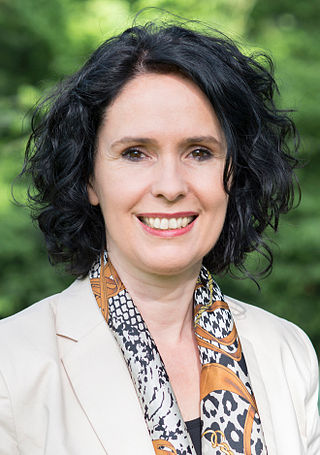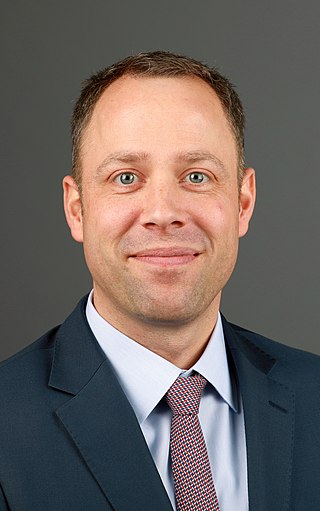
The Christian Social Union in Bavaria is a Christian democratic and conservative political party in Germany. Having a regionalist identity, the CSU operates only in Bavaria while its larger counterpart, the Christian Democratic Union (CDU), operates in the other fifteen states of Germany. It differs from the CDU by being somewhat more conservative in social matters, following Catholic social teaching. The CSU is considered the de facto successor of the Weimar-era Catholic Bavarian People's Party.

The Christian Democratic Union of Germany is a Christian democratic and conservative political party in Germany. It is the major catch-all party of the centre-right in German politics.

The Social Democratic Party of Germany is a centre-left social democratic political party in Germany. It is one of the major parties of contemporary Germany.

Der Stahlhelm, Bund der Frontsoldaten, commonly known as Der Stahlhelm, was a German First World War veteran's organisation existing from 1918 to 1935. In the late days of the Weimar Republic, it was closely affiliated to the monarchist German National People's Party (DNVP), placed at party gatherings in the position of armed security guards.

The Weimar Coalition is the name given to the coalition government formed by the Social Democratic Party of Germany (SPD), the German Democratic Party (DDP) and the Catholic Centre Party (Z), who together had a large majority of the delegates to the Constituent Assembly that met at Weimar in 1919, and were the principal groups that designed the constitution of the Weimar Republic. These three parties were seen as the most committed to Germany's new democratic system, and together governed Germany until the elections of 1920, when the first elections under the new constitution were held, and both the SPD and especially the DDP lost a considerable share of their votes. Although the Coalition was revived in the ministry of Joseph Wirth from 1921 to 1922, the pro-democratic elements never truly had a majority in the Reichstag from this point on, and the situation gradually grew worse for them with the continued weakening of the DDP. This meant that any pro-republican group that hoped to attain a majority would need to form a "Grand Coalition" with the conservative-liberal German People's Party (DVP), which only gradually moved from monarchism to republicanism over the course of the Weimar Republic and was virtually wiped out politically after the death of their most prominent figure, Foreign Minister Gustav Stresemann in 1929.
In the fourteen years the Weimar Republic was in existence, some forty parties were represented in the Reichstag. This fragmentation of political power was in part due to the use of a peculiar proportional representation electoral system that encouraged regional or small special interest parties and in part due to the many challenges facing the nascent German democracy in this period.
These are terms, concepts and ideas that are useful to understanding the political situation in the Weimar Republic. Some are particular to the period and government, while others were just in common usage but have a bearing on the Weimar milieu and political maneuvering.

Theodor Duesterberg was a leader of Der Stahlhelm in Germany prior to the Nazi seizure of power.

Alfred Dregger was a German politician and a leader of the Christian Democratic Union (CDU).
CDU/CSU, unofficially the Union parties or the Union, is a centre-right Christian democratic political alliance of two political parties in Germany: the Christian Democratic Union of Germany (CDU) and the Christian Social Union in Bavaria (CSU).

The Reichsbanner Schwarz-Rot-Gold was an organization in Germany during the Weimar Republic with the goal to defend German parliamentary democracy against internal subversion and extremism from the left and right and to compel the population to respect and honor the new Republic's flag and constitution. It was formed by members of the left-wing Social Democratic Party of Germany (SPD), the centre-right to right-wing German Centre Party, and the centrist German Democratic Party in February 1924.

The Landtag of Hesse is the unicameral parliament of the State of Hesse in the Federal Republic of Germany. It convenes in the Stadtschloss in Wiesbaden. As a legislature it is responsible for passing laws at the state level and enacting the budget. Its most important function is to elect and control the state government. The constitution of the State of Hesse describes the role of the Landtag in sections 75 to 99.

Thorsten Schäfer-Gümbel is a former German politician of the Social Democratic Party (SPD) who has been serving as member of the management board of GIZ since 2019.
Grand coalition is a term in German politics describing a governing coalition of the parties Christian Democratic Union (CDU) along with its sister party the Christian Social Union of Bavaria (CSU) and the Social Democratic Party (SPD), since they have historically been the major parties in most state and federal elections since 1949. The meaning of the term may change due to the growth of some formerly minor parties in recent years.

Norbert Alois Röttgen is a German lawyer and politician of the Christian Democratic Union (CDU). He was Federal Minister for Environment, Nature Conservation and Nuclear Safety in the government of Chancellor Angela Merkel from 2009 to May 2012. From 2014 to 2021, he was Chair of the Bundestag Foreign Affairs Committee.

Katja Isabel Leikert is a German politician of the Christian Democratic Union (CDU) who has been serving as a member of the Bundestag since 2013, representing the Hanau electoral district. Within the CDU/CSU Bundestag Group, parliamentary colleagues elected her one of the alliance's eleven Bundestag deputy chairpersons in January 2018.

Michael Meister is a German mathematician and politician of the Christian Democratic Union (CDU) who has been serving as a member of the Bundestag from the state Hesse since 1994. From 2018 until 2021 he also served as Parliamentary State Secretary at the Federal Ministry of Education and Research in the government of Chancellor Angela Merkel.

Elisabeth Winkelmeier-Becker is a German lawyer and politician of the Christian Democratic Union (CDU) who has been serving as a member of the Bundestag from Rhein-Sieg-Kreis I in the state of North Rhine-Westphalia since 2005.

Georg Nüßlein is a German politician who served as a member of the Bundestag from the state of Bavaria from 2002 until 2021. From 1987 until 2021, he was a member of the Christian Social Union (CSU). He left the party in the wake of his loss of immunity and allegations of corruption related to the procurement of FFP2 masks ("Maskenaffäre").

Mario Czaja is a German politician of the Christian Democratic Union (CDU) who has been serving as a member of the German Bundestag since the 2021 elections.
















